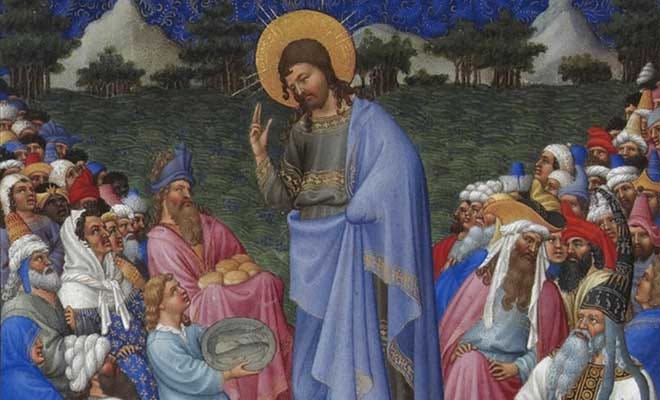The path of discipleship is a lifelong journey from the bondage of sin and death to the sanctity of truth, leading to the promised land of eternal life on Mount Zion.
This journey can be challenging, and during difficult times, we may be tempted to grumble, much like the Israelites in this week’s First Reading.
We should view these hardships as tests of our hearts, opportunities to deepen our trust in God and purify our faith (Deuteronomy 8:2–3).
In this week’s Epistle, Paul urges us to abandon our old self-deceptions and desires, striving to live in the likeness of God in which we were created.
In this week’s Gospel, Jesus admonishes the crowd for following Him for the wrong reasons—they are seeking Him because He filled their stomachs. Similarly, the Israelites followed God as long as their physical needs were met.
We witness four exchanges between Jesus and the crowd. Initially, the crowd, having followed Jesus to Capernaum, asks him straightforwardly, “Rabbi, when did you get here?” Jesus responds by pointing out their true motivation for following him: they have been fed. While Jesus acknowledges this, he challenges them to look beyond their immediate physical needs and seek him for the eternal life he offers.
Food is the most obvious sign because it is the most fundamental of our human needs. While we need daily bread to survive, we cannot live by bread alone. We need the bread of eternal life, which sustains those who believe in Him (Wisdom 16:20, 26).
As the second dialogue unfolds, it appears the crowd might be beginning to understand Jesus and his mission. They inquire, “What can we do to accomplish the works of God?” Jesus tells them they need to believe in the one sent by God. However, in the third dialogue, the crowd’s lack of understanding becomes evident. They ask Jesus for a sign to prove he is from God, despite having just witnessed the feeding of more than 5,000 people. Their request seems unreasonable considering the miraculous feeding they have already experienced.
The manna in the wilderness and the bread Jesus multiplied for the crowd were signs of God’s Providence, reminding us to trust that He will provide.
The crowd’s failure to grasp the deeper meaning of the sign is shown in their reference to the manna provided by Moses. They compare Jesus to Moses, implying that just as Moses gave their ancestors manna in the desert, Jesus should provide a similar sign. They are looking for a prophet without recognizing that God himself stands before them. Jesus clarifies their misunderstanding, explaining that the manna their ancestors received came from God. Just as God provided for their ancestors in the desert, he now offers them food for eternal life through Jesus. The bread given by Jesus nourishes them both physically and spiritually. Jesus wants them to see beyond the physical to the divine source of true nourishment.
The Catechism reminds us, “In the Old Covenant bread and wine were offered in sacrifice among the first fruits of the earth as a sign of grateful acknowledgment to the Creator. But they also received a new significance in the context of the Exodus: the unleavened bread that Israel eats every year at Passover commemorates the haste of the departure that liberated them from Egypt; the remembrance of the manna in the desert will always recall to Israel that it lives by the bread of the Word of God;156 their daily bread is the fruit of the promised land, the pledge of God's faithfulness to his promises. The "cup of blessing"157 at the end of the Jewish Passover meal adds to the festive joy of wine an eschatological dimension: the messianic expectation of the rebuilding of Jerusalem. When Jesus instituted the Eucharist, he gave a new and definitive meaning to the blessing of the bread and the cup.” (CCC 1334)
These signs find their ultimate fulfillment in the Eucharist, the abundant bread of angels celebrated in this week’s Psalm.
This divine nourishment is what God longs to give us. It is the bread we should be seeking, yet often we fail to ask for it. Instead, we pursue the perishable things tied to our daily wants and anxieties, mistakenly believing they are what we truly need: The love of God in the Eucharist. As St. Thomas Aquinas reminds us, “The Eucharist is the sacrament of love: it signifies love, it produces love. The Eucharist is the consummation of the whole spiritual life” (St. Thomas Aquinas).
The final exchange highlights the crowd’s spiritual blindness. They request the very bread Jesus has described, saying, “Sir, give us this bread always.” Jesus plainly states that he is the Bread of Life they seek. He is the one who will satisfy every hunger and thirst. This declaration is the first of several similar statements in John’s Gospel. We understand these statements better when we recall that God revealed his name to Israel as “I am,” or Yahweh. Jesus is now applying this divine name to himself. In the following weeks, we will see how this claim offends the people.
St. Euphrasia exhorts us, “o speak of the Blessed Sacrament is to speak of what is most sacred. How often, when we are in a state of distress, those to whom we look for help leave us; or what is worse, add to our affliction by heaping fresh troubles upon us. He is ever there, waiting to help us” (St. Euphrasia). We must trust God more fully. If we seek first His kingdom and His righteousness, all our needs will be met as well (Matthew 6:33).





